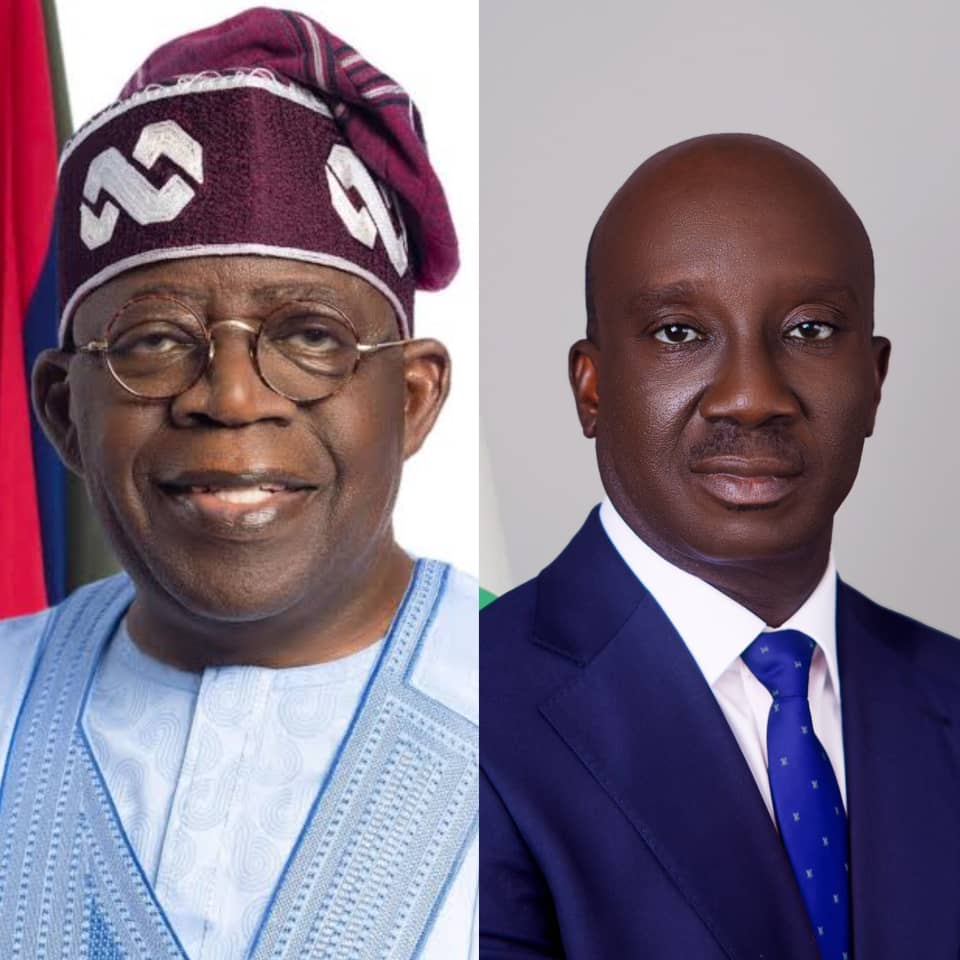President Tinubu, Governor Okpebholo: A Bold Partnership Redefining Edo’s Future
5 min read
President Tinubu, Governor Okpebholo: A Bold Partnership Redefining Edo’s Future
By Fred Itua

By any measure, Nigeria’s federal character is often marred by unhealthy political rivalries and missed development opportunities. Yet, in the heart of this cacophony, a remarkable symphony is emerging in Edo State. Governor Monday Okpebholo, in a move both strategic and visionary, has forged a rare alliance with President Bola Ahmed Tinubu’s administration; one rooted not in partisan posturing, but in purposeful governance.
The result? A dynamic transformation sweeping through Edo, affecting infrastructure, agriculture, youth development, security, and fiscal accountability.
At its core, this partnership speaks of governance maturity. Many governors view Abuja as either an adversary or a funding tap. Okpebholo sees it differently: as a collaborator. Rather than isolating Edo under the guise of state autonomy, he has embedded it within the national development trajectory. Edo is no longer an island but a sailing ship intelligently navigating national currents, maximizing speed by maintaining alignment with federal forces.
Infrastructure development is among the most tangible impacts of this strategic alignment. Historically neglected road networks in Edo towns and villages have become visible projects under federal attention. By engaging closely with the Federal Ministry of Works and leveraging matching funds from the state government, Edo’s highways are receiving the kind of overhauls and expansion they’ve long awaited. Highways linking Benin City to neighboring states are seeing renewed traffic and commerce, transforming economic prospects for countless local communities.
Such infrastructure growth is not accidental; it’s structural. When Abuja approves funding, Edo’s leadership is ready to deploy resources and oversee rapid delivery. This synergy not only fast-tracks development, it also cements investor confidence. That kind of assurance that says, “Hello, there’s a bedrock of federal-state alignment here”, is priceless in today’s investment climate.
Agriculture, often described as the backbone of Edo’s rural economy, is also experiencing a renaissance. Thanks to the federal “Renewed Hope Agricultural Support Programme” and Governor Okpebholo’s partnership, thousands of farmers, many of them women and youth, are accessing improved seedlings, mechanized tools, and capacity-building modules. The First Lady, Senator Oluremi Tinubu, personally supported the initiative’s launch in Benin City, an act that signifies not just symbolic solidarity but deep federal trust in Edo’s leadership.
This agricultural drive is about more than just inputs; it’s about empowerment. It links to education, health, and gender inclusion. By focusing on young farmers’ clubs and female cooperatives, the programme marries federal intent with local dynamism. Rural economies aren’t passive backwaters anymore; they’re springboards for youth-led innovation and sustained growth.
Complementing infrastructure and agriculture is a strong commitment to human capital development. Among the most potent symbols of this is Edo’s ₦1 billion bursary fund announced within months of Okpebholo assuming office. This mirrors a national drive towards youth empowerment, where access to tertiary education is seen as both a right and a pivot for opportunity. Vocational training hubs, digital centres, and job creation initiatives are emerging as logical extensions, a clear echo of federal youth policies implemented deftly at the state level.
Yet for all this growth, Edo is not slipping into fiscal recklessness. Quite the opposite. With decisive reforms in revenue generation and expenditure efficiency, Governor Okpebholo has overseen the dramatic reduction of the state’s domestic debt by ₦30.6 billion within three months; the largest such dip among states nationwide. This is not a story of headline-seeking austerity; it’s about fiscal engineering and sustainable optimism.
Such fiscal steadiness resonates nationally. Edo’s performance rings in Abuja’s economic corridors as proof that strategic partnership can yield credible returns on investments, both human and financial. That kind of status-sharing in federal circles isn’t trivial. It could lead to enhanced creditworthiness, better loan terms, and recognition as a stable investment landscape.
Security, often the Achilles’ heel of Nigerian states, is another sector experiencing contract-level alignment between state and federal forces. Coordinated efforts have suppressed cult-related violence, stabilized restive rural areas, and softened farmer-herder tensions that once threatened civil order. This is not a parade of force but of structure: joint patrols, shared intelligence, and direct coordination with federal security agencies.
That improved stability has a multiplier effect. Investors see predictability; grassroots communities experience normalcy; local economies begin to thrive again. That matters exponentially more than any glossy road or cut ribbon; it underpins sustainable ecosystems of livelihood and wellbeing.
What’s perhaps most compelling about this transformation is its quiet nature. There are no smoke-and-mirror press events, no photo ops with Federal Ministers. Instead, there’s substance. Road machinery working through nights. Grain aggregated for cooperative use. Scholarships mailed to students. These are administrative rhythms, not political stunts, yet they yield extraordinary resonance.
Central to this quiet revolution is Governor Okpebholo’s leadership philosophy: partnerships, not politics. He appears to speak less about grandstanding on national stages and more about delivering results where people live: villages, schools, and markets. This is governance that listens, with civic ears tuned to development needs, not political paranoia.
Nigeria’s federal structure often shines brightest when the centre and the periphery operate not in defiance but in sync. Composite success emerges not from monopolistic control but from bilateral trust – trust that Edo is responsible, accountable, and deliverable. This Okpebholo-Tinubu synergy is becoming a quiet exemplar of that trust in practice.
The journey has just begun. The early chapters of this alliance already speak of infrastructure, agriculture, education, security, and fiscal discipline. But the real story lies ahead when these reforms democratize opportunities across every local level, when rural farmers talk of new incomes, when university students graduate debt-free, when investors believe in Edo’s predictable climate.
Nigeria needs narratives like these: ones that bridge levels of government, unify purpose, and yield visible transformation for everyday citizens. Put simply, Edo under Governor Okpebholo is confirming something few dared articulate: when cooperation replaces conflict, when ambition routes through institutional capacity, and when governance becomes engineering, everyday people, not politicians are the ultimate winners.
For now, Edo is winning, decisively. And if the road signs so far are anything to go by, Governor Okpebholo’s partnership with President Tinubu may well write one of the most compelling chapters in Nigeria’s evolving story of cooperative federalism.



